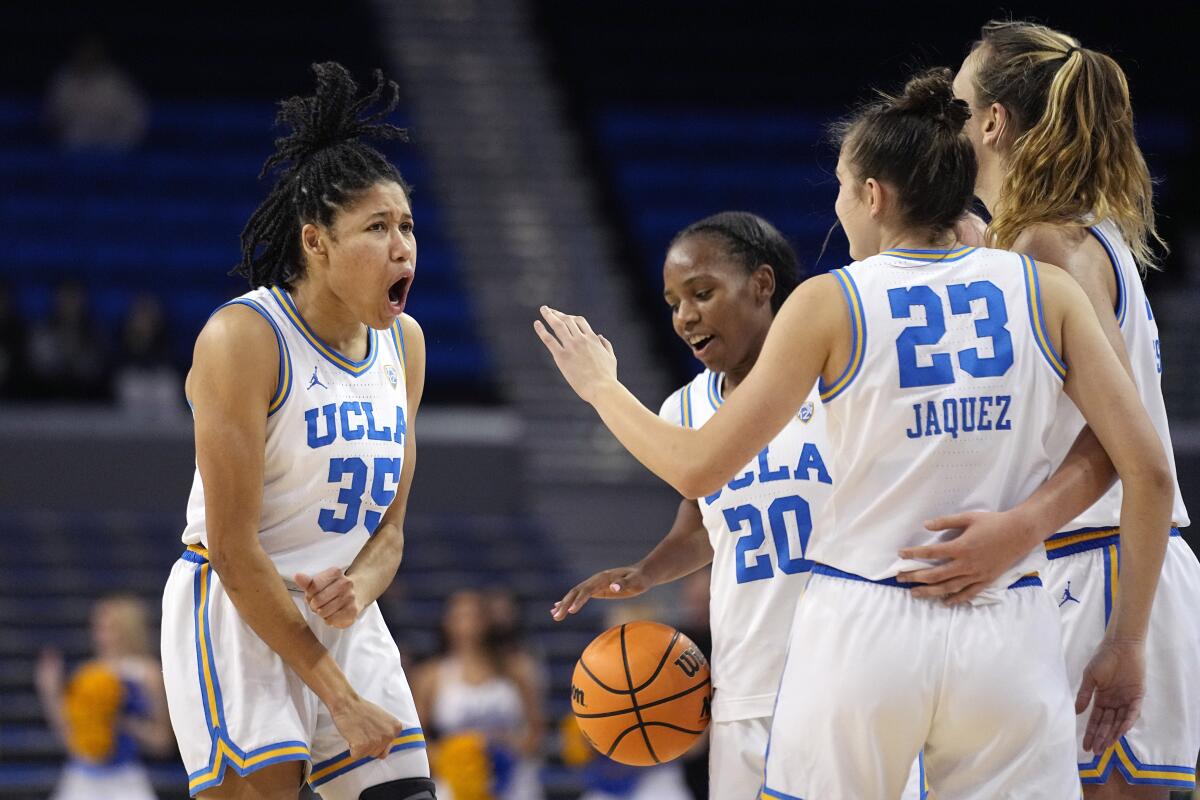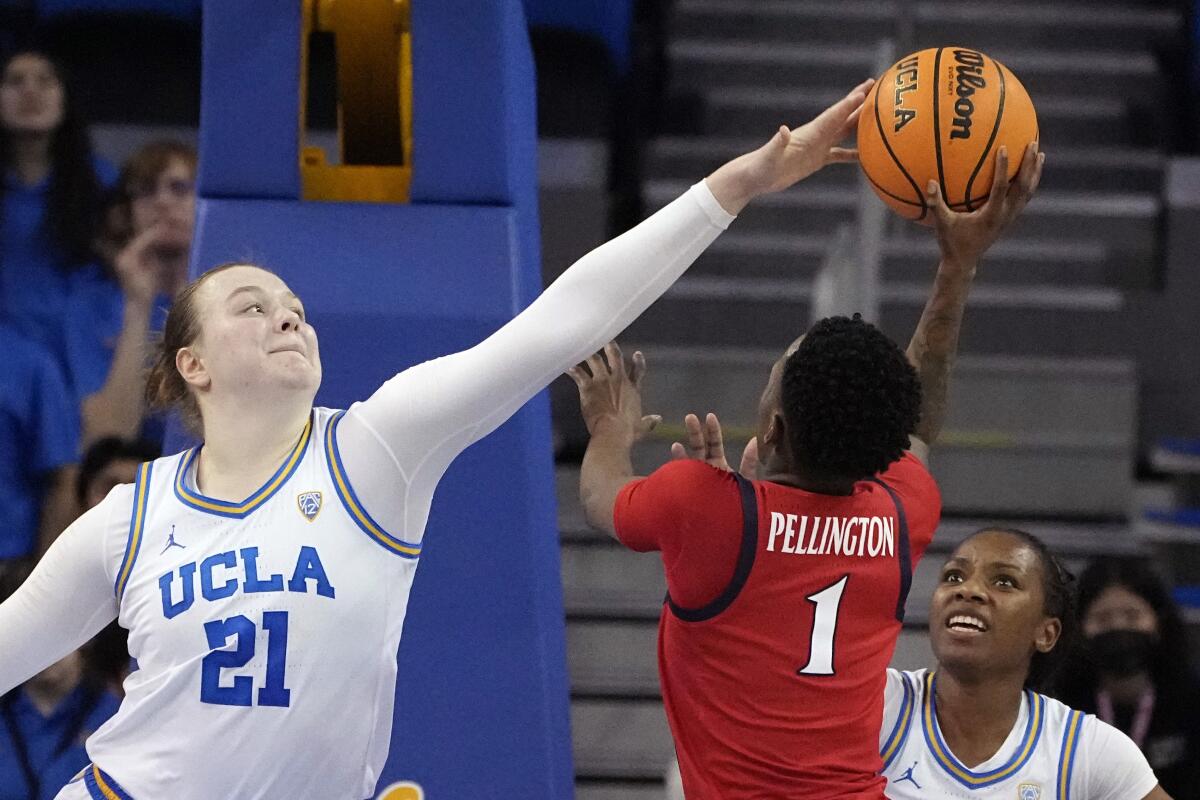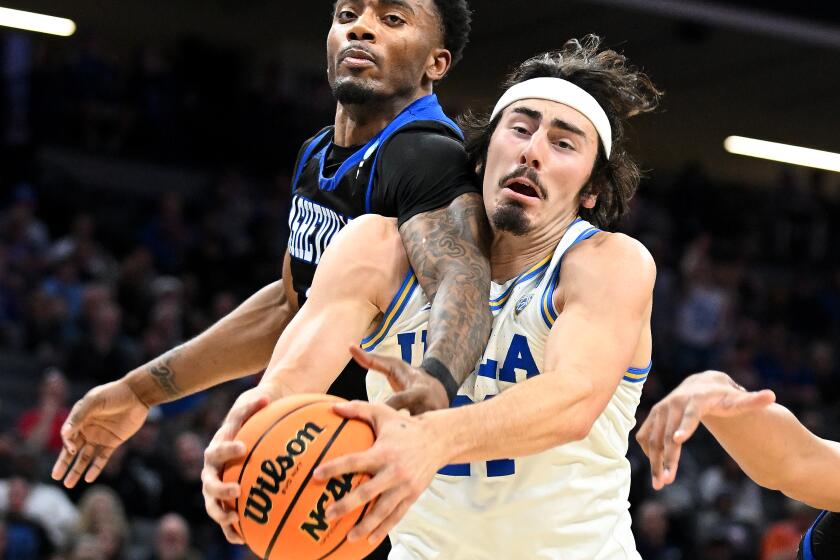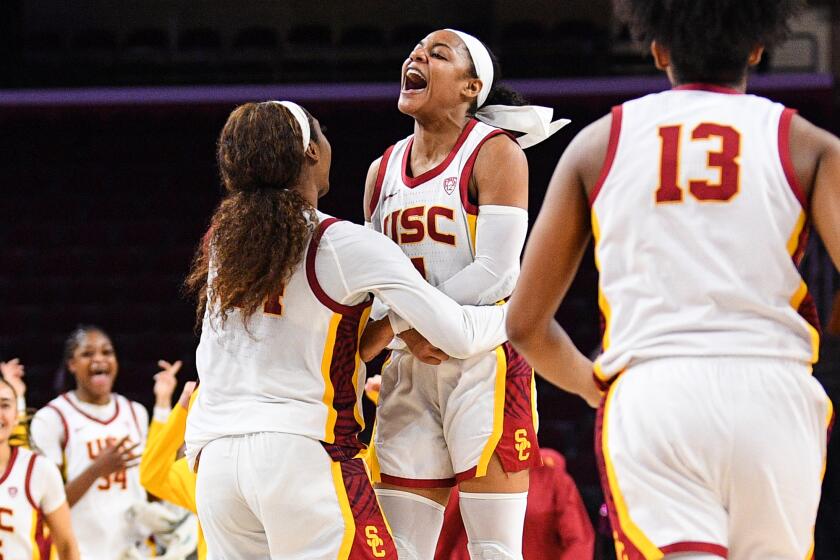What is a passion play? UCLA reveals the secret behind its March Madness surge

- Share via
Before the chaos of March descended on Pauley Pavilion this week, Cori Close gathered her team at center court at the end of practice. During this time of the year, teams that remember and embrace their identity find the most success, the UCLA head coach reminded her players. That foundation helps overcome inevitable NCAA tournament adversity.
The Bruins, she reassured them, know their identity.
“Defense, rebounding,” Close said, “and passion plays.”
The third category is the secret to UCLA’s success. Fueled by an alternative stat sheet of typically intangible actions, the No. 4 seed Bruins return to the NCAA tournament after a one-year absence to host No. 13 seed Sacramento State on Saturday at 8:30 p.m. in the first round of the Greenville 1 region at Pauley Pavilion. The game is on ESPN2 with the winner advancing to play No. 5 Oklahoma or No. 12 Portland on Monday.
No. 2 seed UCLA cruised to a 86-53 rout of No. 15 seed North Carolina Asheville in the first round of the NCAA men’s tournament on Thursday.
UCLA tracks seven passion play categories that don’t show up in traditional box scores. The list has grown since Close first implemented the strategy when she was hired at UCLA in 2011, and the Bruins now count screen assists, assist box outs, charges, deflections, out-of-area rebounds, baskets scored with no movement required once the pass is received and 50-50 balls.
Grad assistant Jaelynn Penn, who played for the Bruins last season, tallies each passion play during the game using a pen, sheet of paper and clipboard on the bench. The team’s goal is 75 each game. UCLA’s best performances this season are 79 against Oregon State and 78 against Oregon. The Bruins won both games at Pauley Pavilion.
“Trying to honor all [things] coaches know that lead to winning plays that don’t show up in stat sheets,” Close said.
Senior Charisma Osborne leads the Bruins in scoring with 15.5 points. Forward Emily Bessoir, UCLA’s top rebounder at 5.8 boards per game, broke out in the Pac-12 tournament for four consecutive double-digit scoring efforts and was named to the all-tournament team with Osborne and freshman Kiki Rice.
But when it comes to passion plays, Camryn Brown and Lina Sontag are the stars.
Brown, a senior, averages three points per game. Her career high in scoring is nine. She has also been named the team’s passion player of the game nine times this season, tied with Sontag for the team lead.
Sontag, a 6-foot-3 forward, feels like “the passion player of the century,” Osborne said.

“If you see your stats and they’re not good, sometimes it can be a little frustrating, but to see your passion plays, that really perks me up.”
— Lina Sontag, UCLA forward
“Her ability to trace the ball and get deflections, especially at her size, is incredible,” Close said of the freshman from Germany. “The best I’ve ever seen.”
Sontag averages 5.1 points and 4.2 rebounds in 17.2 minutes per game. But it’s not uncommon for her to notch between 15 and 18 passion plays a game to win the team award. She had one game with 24 this season.
Coaches always told Sontag, a regular contributor on the German youth national teams, that she excelled at deflecting the ball and making hustle plays, but she had never seen it quantified the way UCLA does. The focus on passion plays at UCLA has brought a different level to her game.
“If you see your stats and they’re not good, sometimes it can be a little frustrating,” Sontag said, “but to see your passion plays, that really perks me up.”
Close decided long before she got her first head coaching job that tracking and celebrating small plays would be an important pillar of her program. The Bruins acknowledge the player who gets the most passion plays each game by showing a highlight reel of their plays during a meeting before the next game. By sharing praise beyond just the leading scorer or rebounder, teammates see the value of impacting the game in other ways.
USC’s defense is a perfect combination of personnel, planning and passion. It’s why the Trojans are in the NCAA tournament for the first time since 2014.
“You celebrate the kind of teammate you want to be,” Close said, noting how Osborne, who is the team’s leading scorer and a potential first-round WNBA draft pick, is also the team’s best screener. “When you value that and your best players value that, I really do think it breeds a selflessness and a teamwork value that we all know leads to wins in big moments.”
Penn, who joined the Bruins as a grad transfer from Indiana last season, tracks each passion play on a chart during the game. She reports to Close during every media timeout how many the Bruins have and the coaches emphasize whether the team needs to keep up its current pace or pick it up for the next segment. When the team goal is in sight, players sometimes urge Penn to be lenient on the more objective categories like out-of-area rebounding or 50-50 balls. She responds with a side-eye look.
These numbers don’t lie.
More to Read
Go beyond the scoreboard
Get the latest on L.A.'s teams in the daily Sports Report newsletter.
You may occasionally receive promotional content from the Los Angeles Times.









